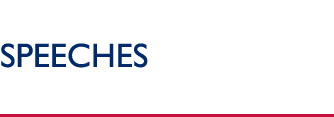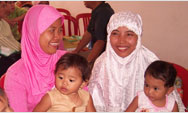 |
|
 |
 |
 |
- 10/21/08: Remarks by Henrietta Fore, Administrator, USAID and Director of U.S. Foreign Assistance at the White House Development Summit
- 10/08/08: Remarks by Henrietta Fore, USAID Administrator and Director of U.S. Foreign Assistance at The President's Freedom Agenda
- 10/01/08: Remarks by Henrietta H. Fore, Administrator, USAID and Director of U.S. Foreign Assistance, at the Ceremony Marking the Full Operational Capacity of Africa Command (AFRICOM)
- 09/25/08: Remarks by Henrietta H. Fore, Administrator, USAID and Director of U.S. Foreign Assistance, at 2008 Millennium Development Goal Malaria Summit, New York - "U.S. Leadership in the Fight Against Malaria"
- 09/22/08: Remarks by Henrietta H. Fore, Administrator, USAID and Director of U.S. Foreign Assistance, at the White House Symposium on Advancing Global Literacy - "U.S. Commitment to Advancing Global Literacy"
 RSS Feed for Recent USAID Speeches and Testimony RSS Feed for Recent USAID Speeches and Testimony
|
|
 |
 |
|
Remarks by Henrietta H. Fore
Director of U.S. Foreign Assistance and Administrator, USAID
U.S. Commitment to Advancing Global Literacy
White House Symposium
on Advancing Global Literacy
New York City, New York
September 22, 2008
[Remarks as prepared]
Thank you, Ambassador Oliver.
To the First Lady of the United States, Mrs. Laura Bush, to the spouses of the heads of state attending the UN General Assembly, to Unesco's Director-General, His Exellency Koïchiro Matsuura, to the Ministers of Education, and the UNESCO Permanent Ambassadors, and to the NGO and private sector leaders with us today:
Thank you for your leadership.
USAID currently supports education activities in more than 55 countries world wide.
In Haiti, young boys and girls are gaining the skills they need through an education and training program that prepares them for the world of work.
In Albania, we are working with officials to protect vulnerable children and to make it possible for them to thrive despite difficult circumstances.
We too are especially concerned that women and girls receive the resources they need to care for themselves and their families. We have seen the empowerment that comes from the ability to read and write.
Adult literacy programs in Angola and Bolivia have helped build self-esteem and improve the quality of life for thousands of individuals.
In fact, a recent study from the United Nations University looked at GDP growth rates over the last decade in 54 countries - and found that a country's Gross Domestic Product rises with its literacy rate.
In some cases, it rises exponentially, and for the worst-off countries, we can expect to see significant gains in GDP with improvements in literacy. These gains can mean the difference between extreme poverty, and a first rung on the ladder to sustainable prosperity. The difference between the desperation that can make young men and women recruits for extremists, and the hope that can make them the foundation for a country's future.
Our combined efforts are helping individuals to make the difference - you have seen on the screen behind me just a few of the faces of those who we are helping to realize the freedoms that literacy brings.
Overall, with the support of the American people, the President and Congress have increased basic education funding nearly seven-fold since the year 2000 - from $98 million to $694 million this year.
Not only as Administrator of USAID, but also as the Director of United States Foreign Assistance, I am also pleased to enumerate on what First Lady Laura Bush announced earlier - namely that USAID and the Department of State will combine their financial resources to provide a $2.5 million grant to support the new UNESCO Literacy Decade Fund. This worthy initiative will extend the benefits of best practices and effective literacy programs to communities with high illiteracy rates.
To be sure: This is an act of good faith and goodwill from the American people as well as a global imperative that touches every singular person in need. It reflects the fact that everything we do to support literacy is a practical priority as well as a moral imperative, because it provides the basis for economic self-sufficiency, which in turn supports households, villages, and regional stability.
We have seen it in Afghanistan, where 8,500 women in 10 provinces have received training in healthcare and now provide much-needed local services for their communities.
And in the most immediate terms, we have seen that success in the eyes of young girls like Oumou Ndiaye, who lives in a remote village on Senegal's eastern frontier, and Segenet Wendawork, who knoes she has defied the odds in Ethiopia. Both of them - together with 300,000 other girls in 40 African countries - are going to finish high school on USAID scholarships and have real hope for productive, prosperous lives.
The President's Initiative to Expand Education, which focuses on early childhood education programs worldwide, is on treack to provide quality education to as many as four million children in the six initial targeted countries of Ethiopia, Mali, Ghana, Liberia, Honduras and Yemen. In Africa alone, we have trained more than 700,000 teachers in 20 countries.
As First Lady Laura Bush has said, "when governments inverst in literacy, opportunities for children and families improve, economies grow stronger, and citizens can better protect their health." Mrs. Bush has worked tirelessly and effectively to promote literacy, and thereby lift people out of poverty and into prosperity and a better life.
And what we know is that basic numeracy and literacy are the ultimate information technology. Let me give you an example - a true story from Liberia, where I just visited two weeks ago.
After solar panels were delivered to a school site to generate electricity, the local workmen who showed up to install the panels could not read the instructions. The project manager made sure to read the instructions to the crew before having to leave to oversee another project somewhere.
When that project manager came back to check on the progress, he found the installation had been completed quickly and correctly.
The point being, the project manager's ability to read makes him/her the best communicator on the ground to ensure that the day's work was accomplished. However, think of how many more projects the local workmen could have been able to carry out had they all been able to read.
Multiply that one example in a Liberian village across every struggling nation and region around the world, and you quickly appreciate the magnitude of the opportunity. And that opportunity is not just for me.
The data show consistently that when women gain literacy skills and are better able to understand nutrition and healthcare, there is a multiplier effect - benefits to their health, and reduced infant mortality, and corresponding reductions in birth rates, and health for the whole family.
We have seen such success in Yemen, funding a literacy program that has helped nearly 600 women in the Amran district understand how to stop the spread of disease.
The United Nations Literacy Decade Fund, announced today, will make a difference in the coming years so that we may continue to share successful programs across communities and nations. We are pleased to be able to partner with Mrs. Bush and UNESCO to continue to advance the cause of global literacy.
I would like to thank Mrs. Bush and this distinguished panel in leading the effort to promote literacy around the globe. I am deeply impressed by the commitment with which so many of you approach this work and honored on behalf of USAID to join you as a true partner. You have our wholehearted commitment to join you in this cause.
Thank you.
Back to Top ^
|


